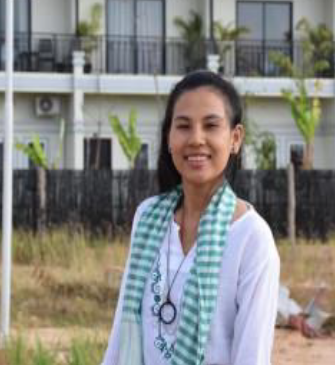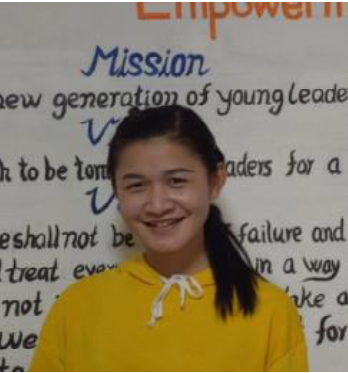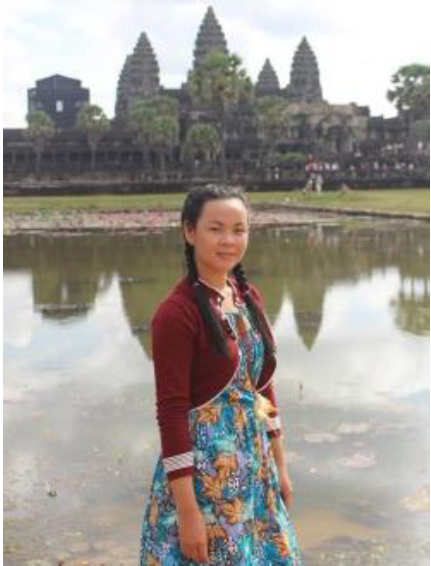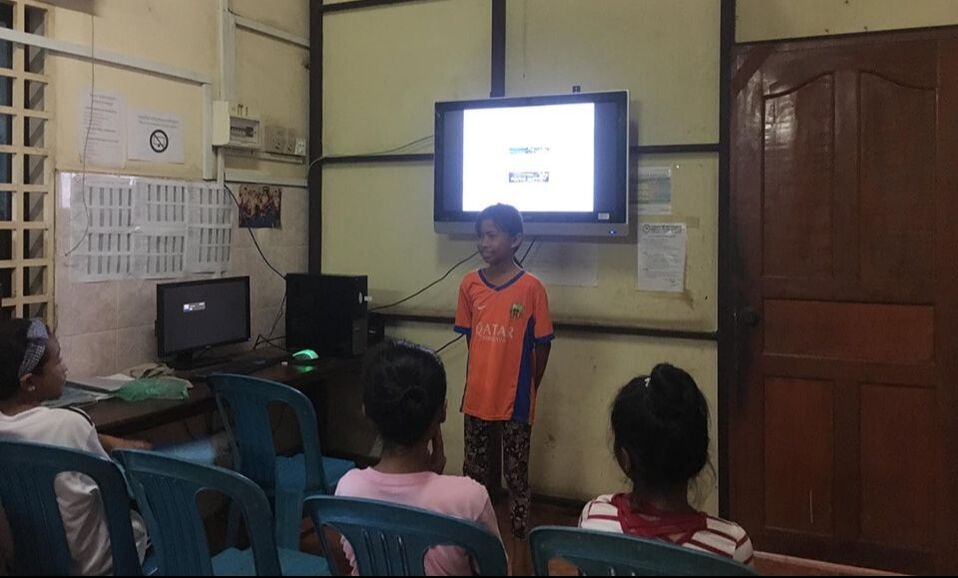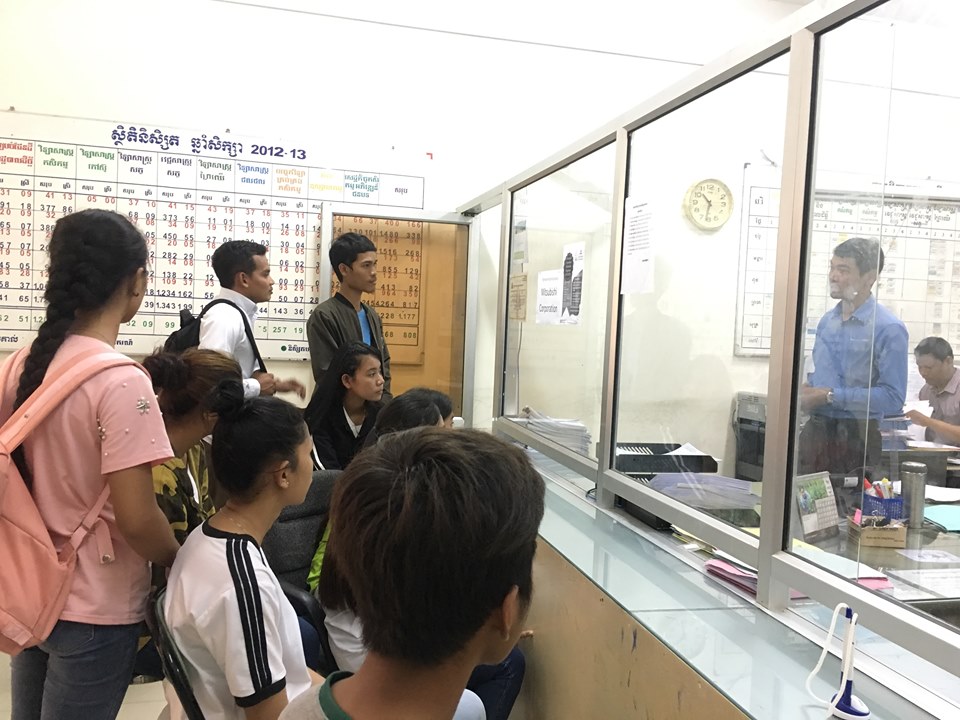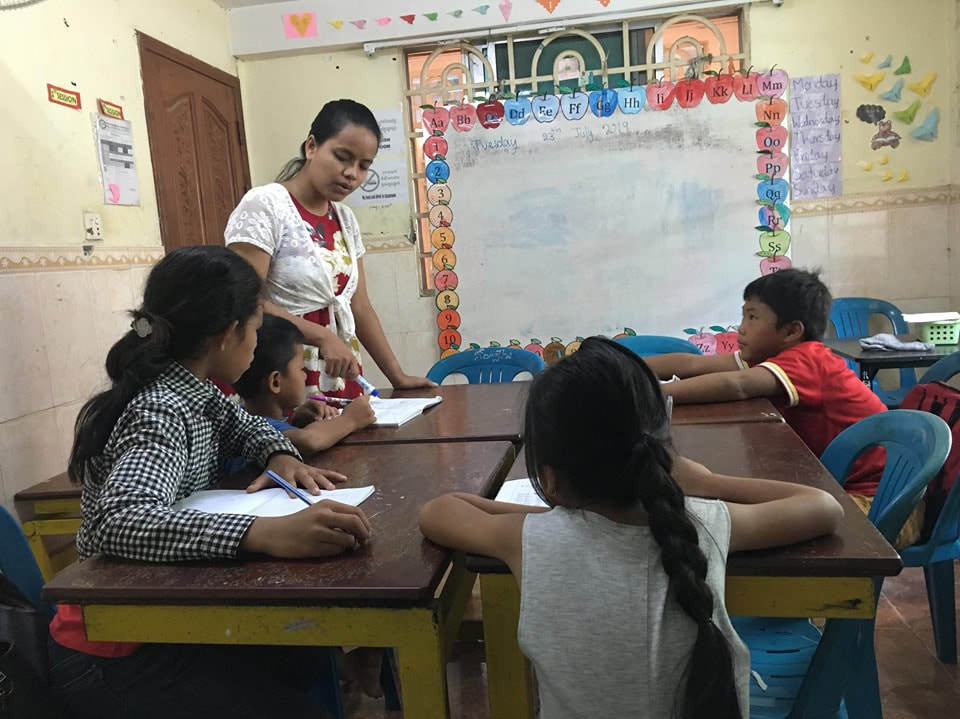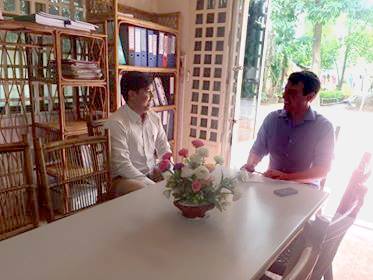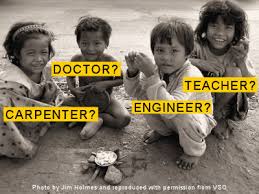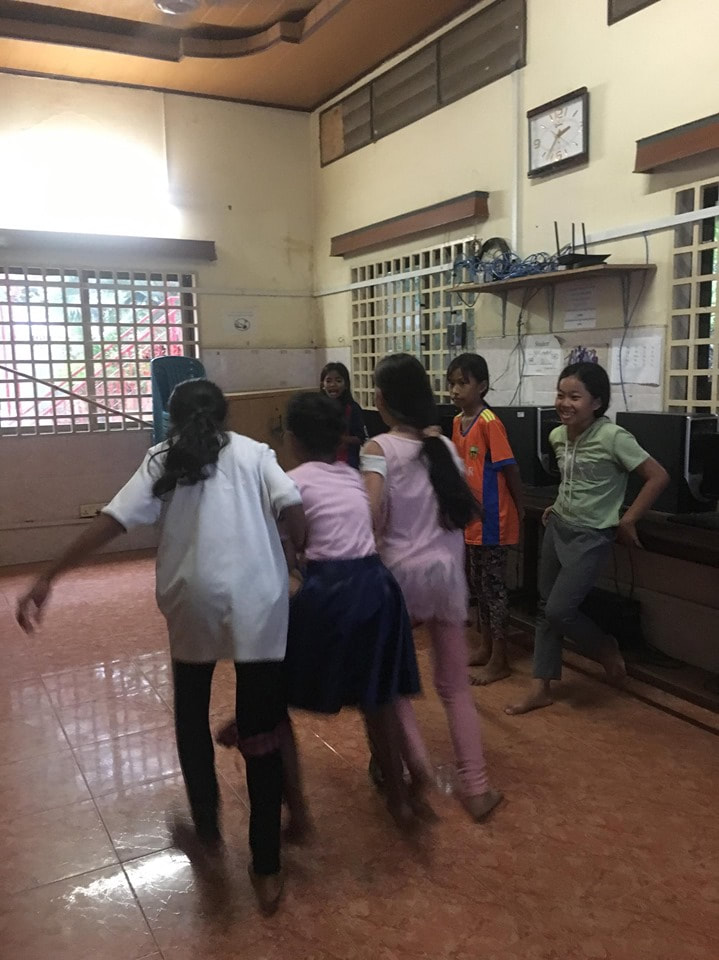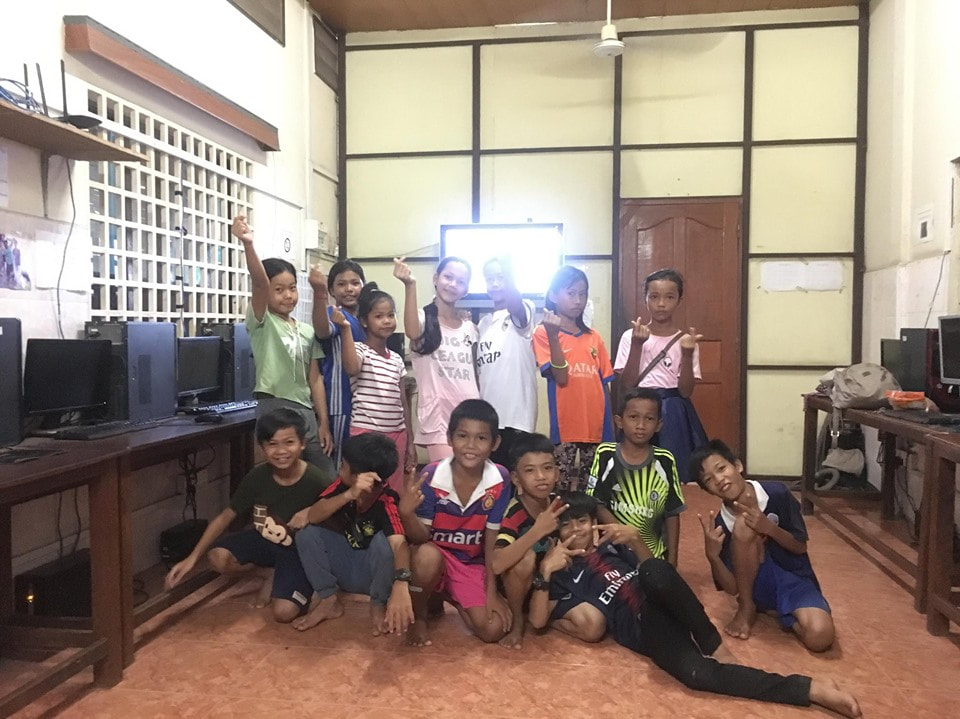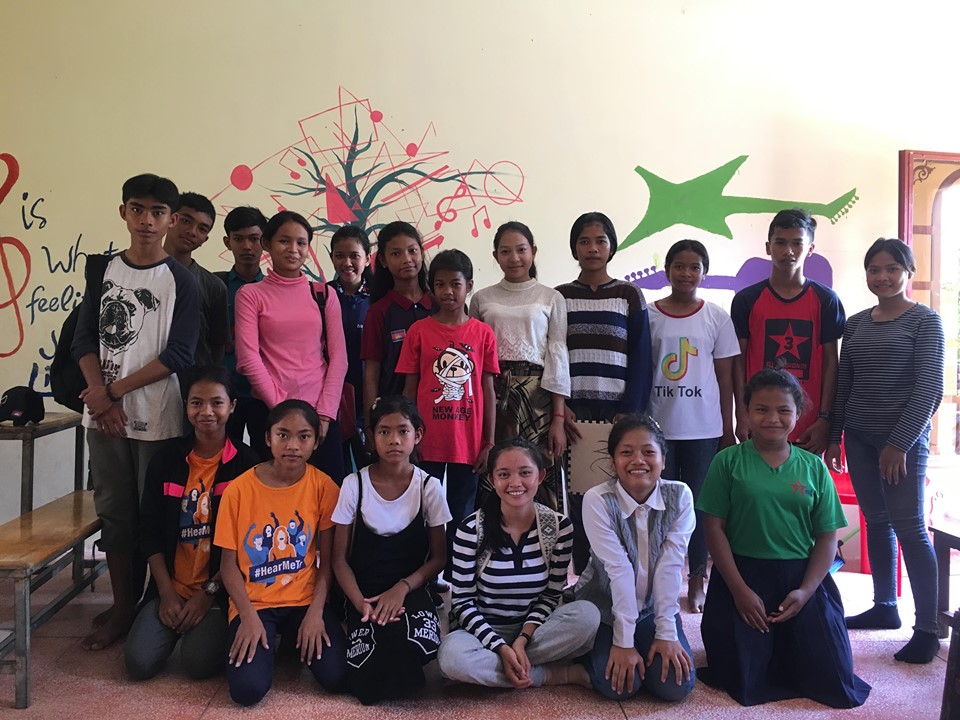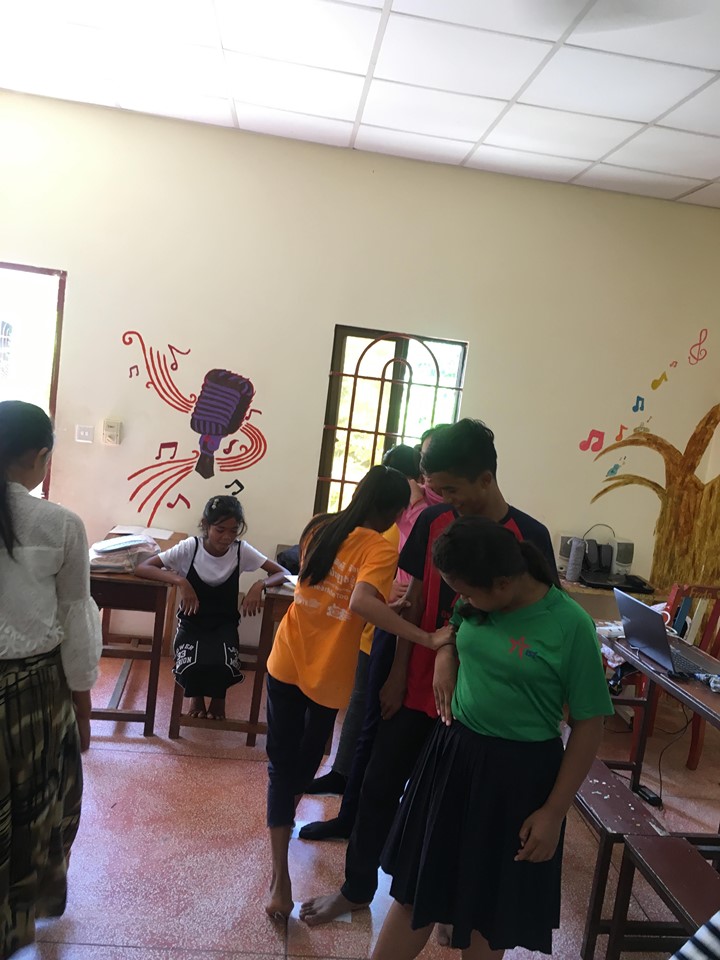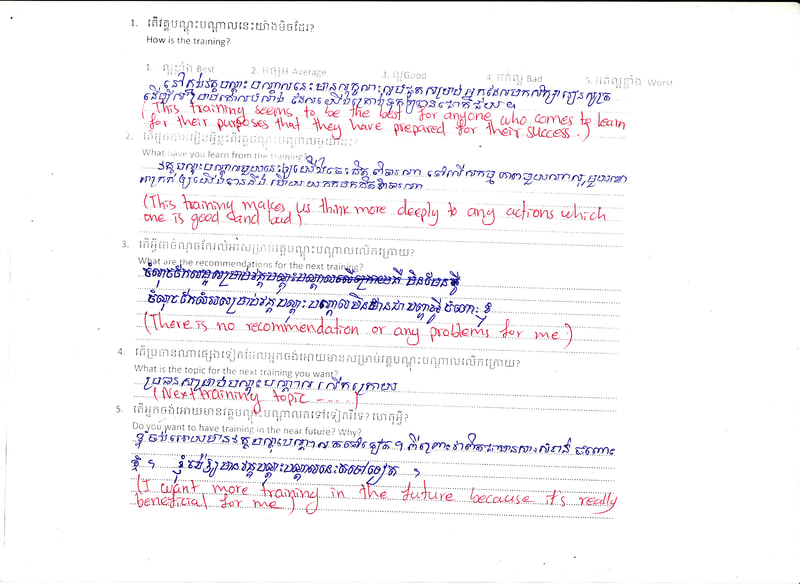|
Emily Cohen from Stichting Dom-Ray was able to visit the CSEP this summer, and met with Seanhong, the new teacher working there funded by Golden Futures. She has sent these two videos, one of Seanhong speaking about what it is like to work at the CSEP, and one showing his English lessons in action. Seanhong speaking about working at the CSEP English lessons at the CSEP
0 Comments
About a year ago, Emmy Cohen from Stichting Dom-Ray approached us to ask if we could support the hiring of another teacher for the Countryside Education Project, the school established in Kor village by Chork Ratana, one of the very first students that Golden Futures supported. Thanks to the funds raised by the Virtual London marathon, and the support we were able to secure from the Allan and Nesta Ferguson Charitable Settlement, we were able to contribute to this and jointly support NFC in hiring this additional member of staff. Here is a rundown of the progress of the project, and how the money has been spent. The planned total project budget was: US$15,597, so at that point around £10,925. (The cost of our projects varies significantly due to exchange rates. All the money we spend in Cambodia is USD, and the money held by NFC on our behalf is in a USD denominated account. As the value of the pound changes, the amount that projects cost us changes considerably. For example, at the planning stages of this project £1 was worth $1.40, it is now worth $1.20. That change has meant we need to find an additional £1,821 for the project. We can safeguard against this risk by holding more money in USD, but that has an additional risk as that means keeping money in Cambodia without the same safeguards that we enjoy in the UK.) The overall project costs for 3 years were: Salary costs - US$10470 (Salaries for staff are set by NFC, as the employer, based on the Cambodian market rates. NFC always tries to pay fairly and this allows them to recruit better quality staff who work with the projects for longer.) Tax @ 10% - $1047 Lunches at project* - US$2520 (NFC covers the cost of simple lunches for staff whilst on project as the remote location makes it difficult for staff to buy their own lunch) Expenses (Travel and telephone costs) - US$1260 Health fund contribution - US$300 Suon Socheat, Director of NFC, has reported: “The second teacher of CSEP, HAY Seanhong, started working on the project in early October 2021. He and the rest of the staff work a minimum 8-hour per day, from Monday to Friday. Sometimes they were asked to work overtime and weekends when we needed to. We are really satisfied with the work they perform on a day-to-day basis. The CSEP children really benefit from their hard work, especially on their extra education in the project, such as English, computer, and learning habits on their Khmer general education. According to my observation, I have found that the children have been improved from time to time, particularly learning becoming their preference.” The post-Covid labour market in Cambodia is challenging, and with the project located in the countryside it can be doubly challenging to find high-quality staff members. Whilst New Future for Children were unable to appoint in their first round of interviews, the position was re-advertised and local partners and networks were used to ensure a strong candidate willing to work outside the city could be found. Regarding challenges in implementing the project, Suon Socheat added: “From the beginning there was some doubt from the children's parents whether it is necessary to allow their children to study at CSEP. But, their minds have drastically changed when they could see their children's achievements. For instance, when their children start to speak English, they are able to use computers, and older children obtain scholarships to study at university in the city. Now we have about 170 underprivileged children in the CSEP classes (English and computer), and about 50 children have registered but are waiting for the classes too. They must wait until we have a third teacher of English and more rooms for the classes. We plan to have a third teacher of English. COVID-19 produced a very bad impact on our CSEP project. Almost two year that our CSEP classes could not open physically. We had some experiences opening and closing the physical classes frequently. Our children could not get regular education. Indeed, our staff processed online classes but the majority of the children could not attend because they did not have a communication device and internet to assess the classes. We were suggested to them to form group learning but it worked slowly because of the internet connection and the concern of infection transmission. CHORK Ratana, our project coordinator and a co-founder, stopped working before the covid-19 outbreak, and then we recruited a new project coordinator. The second project coordinator worked about 2-month also resigned during the terrible covid-19 outbreak. Then, we hired the third coordinator, HEAM Sambath. He worked about 2-years and then resigned because he wanted to move to live with his wife in the city. However, right now we have been hiring the fourth CSEP coordinator, MAO Bean, who has family in the same province of CSEP, and who has committed to stay longer with us. He has a very good experience on community development, teaching English, and working with children. He has started working at CSEP in early July 2022. Our teachers of English and computer teachers had some experiences in teaching before, but their teaching pedagogy and technology were limited. To improve their teaching and working capabilities we sent them to get some training from our NFC staff and volunteers. After spending one week each, they gained new knowledge and more experiences in teaching and class management.” Our next challenge is to look at securing funding to continue supporting the CSEP after this round of funding finishes, and if possible to find money to support a third staff member so the 50 children on the waiting list are able to access education as well. Donations to support with this can be made through People’s Fundraising here. Here Phallen, our third new scholarship recipient, talks about how her family have scrimped and saved to support her as best they could to study at university, despite not being able to afford clothes and other basics.
"My name is KUCH Phallen. I am 21 years old. I am from KompongCham province and I have four siblings. As a girl who come from a small-scale farming family, which is one of the worst-off familes in the community. I am the first child of six. My clothes were given to me by the neighbor and aunt. Because of our rural area community, people do not value the education. When I nearly finished high school, my mother broke the bad news to me that I might not be able to study at university, because my mother and my father would not be able to support me. They wanted me to work as a tailor. I was concerned since I did not want to drop out of school, and promised myself that I would pursue to further my education. Fortunately, when I finished high school in 2016, I passed the Chevening internship program, supported by the British Embassy of Cambodia. It gave me a chance to work as assistant legal and tax service in DFDL Company; through this I got the chance to study a bachelor’s degree at Royal University of law and Economic which majority is International relation. At that time, many of consequences were attend myself, because living in city it can be meet any problem all the time, and I was unsure with the situation. Because of financial problem and lack of information I had drop out of university for one year after I finished my foundation year. Luckily, I was fortunate to be introduced to a scholarship program at Advanced Centre for Empowerment (ACE), in Phnom Penh that provides a free accommodation and leadership training skills for university students and also gave me great opportunity to study English at Australia Centre for Education which I could develop myself and got the chance to teach children who live in the slum, wait for my mum to help save up some money to afford my university. So every year, I am so worried about how I am getting on with the university fee without study one year and then stop one year to save, then study." The second of our new students for 2019/20, Sreythuch has had to work in a footwear factory, but hasn't lost sight of her dream.
"Pursuing tertiary education is what every student dreams of, but there are a couple hindrances that make them cannot achieve their dreams. Personally, the reason why I need support for my study at the University because I have faced a financial hardship. Due to this problem, I have to take a gap year for one year and work in a footwear factory (producing glove, socks, shoes), and I cannot continue my studying like other children; however, I never give up. Every day, I try all my best to seek for any opportunity that could help me to pursue my education which is my big dream, but until now I have not got scholarship for university yet. Furthermore, I am a student coming from province. My parents are farmers; hence, they cannot earn sufficient money to support our daily living. At the same time, there is not only me who need to continue my studying, but also do my siblings. So, it is the big burden for my parents to support us. In short, studying at the university costs many things that I and my parents find it is hard to support. Although I am in this trouble I never think that I have to drop out of school, I still have a strong believe that I will reach my dream one day. I believe college education would give me the opportunity to explore new ideas, improve critical thinking, and enhance my skills. It is the best gateway to better options and a chance to succeed in life. In my mind, I have always wanted to move on to college and finish well and proud of myself. Moreover, as a student in University not only provide me knowledge, but it will provide me with the tools and information to serve my community with excellence and make a difference due to my future career." Vuthy Phai Er is the first of the four young people living at the Advanced Centre for Empowerment we will be providing with scholarships this year. Below is her statement describing her background, and her dreams for the future.
Scholarship is very important for me to continue to study and achieve my future goal. I was born in a poor farming family in the countryside. In my family, there are five members, two brothers and three sisters and am a youngest. My mother name is Sok Neang. She is a farmer, 60 years old. My father name is Iy Vuthy. He is a cowboy (taking care of a few cows), 65 years old. My parents can earn around 5$ or less per day. As the first-generation student in my family who growing up in a rural area community many obstacles have been stuck in my way of my life, but since I am the one who love learning, understanding the value of high education and how it would impact my life. I know that a college education would give me the opportunity to explore new ideas, improve critical thinking, and enhance my skills. It is the best gateway to better options and a chance to succeed in life. In my mind, I have always wanted to move on to college and finish well and feel the pride. Moreover, as a student in university not only provide me knowledge, but it will provide me with the tools and information to serve my community with excellence and make me difference due to my future career. However, I graduated from high school since 2015. After one year to another until 2019, I still cannot go to university because of my family’s financial challenge (I even go to work in a garment factory to help earn some income), so it made me really upset and cry for many times. I saw my friends and my villagers go to study in city, it made me feel jealous and yet proud of them. But I don’t know how to do. What I can do just asking my-self the same questions every day that “Will I have a chance to study in university like other?” But it never got an answer. And I knew that it was impossible. I spent one year to be a seller/vendor (small store that sold soft drinks and children packed-snack food) in one of public school near my house called “KOKITHOM PRIMARY SCHOOL”. Then, I got a chance to be an ABC English Teacher in that school village. A month later, I can earn around forty dollars a month, but I still cannot go to study at university due to I can’t support myself for university fee, school supplies, accommodation and food. And it made me felt hopeless. But in my mind, I still believe that there are some ways that I can do and I never give up, I always told myself one day I will go to study at university. Fortunately, my great change was coming because I had met one aunty in my village her mane is Pov. She told me that now Advanced Centre for Empowerment (ACE) provide accommodation for university student, then I applied to stay at ACE with unsure if I was selected. With great opportunity, I pass. ACE offer me a place to stay and could only find scholarship for me to improve my English, so that I can volunteer to work as an English Teacher at the slum community center and not only being as an English Teacher, but you will have a chance to develop yourself to be better person in the future especially being a good leader. I am currently staying at ACE, with little compensation allowance ACE could afford. I am looking to go to university this October 2019 with hope of scholarship opportunity. At Golden Futures, we have been working with New Future for Children (NFC) for twelve years. We have supported over 30 young people through university and given advice and support in accessing vocational training to many more. From our first loan back in 2008, covering driving lessons for a young man wanting to become a professional driver, to providing university loans for courses as varied as nursing, interior design, fine art and electrical engineering, it has been an ongoing challenge to remain responsive to the needs of our beneficiaries and to tailor the support we give to make sure it has the biggest impact possible. Last year, I had the happy task of visiting Cambodia to catch up with some of our graduates. I met young people with good jobs, houses and families, happily establishing themselves in Cambodian society – far from the vulnerable children they were when we began to work with NFC. It is very rewarding to see the potential in these young people come to fruition, to see the positive impact our support has on their lives and the positive contributions they can make to Cambodian society. Over twelve years there have been many changes to the way we work, but the key principle that has always underpinned everything we do is the desire for sustainable support that respects the autonomy and potential of our beneficiaries and acknowledges and develops their resources and potential to give back in a range of ways as soon as they are able to. Some of the biggest changes to the way we work have been over the past four years. The first was the decision to stop using student volunteers travelling out over their summer break to implement some of the Golden Futures projects. For many years, groups of student volunteers from the University of Nottingham came out to Cambodia to work on our projects. At first this was organised by Student Community Action, then the Student Volunteer Centre, and then for the last few years was taken on by Intervol. When Intervol were unable to find a group of volunteers for us, this forced us to act more quickly on something that we had been considering for years, investigating ways to have a local representative working on Golden Futures projects all year round. Fortunately, we were able to collaborate with Stitchting Dom-Ray and COLT in supporting NFC to take on an additional staff member to focus on supporting the young people at NFC, at the midway house, and in the countryside. When Seng Ratha began working for NFC we were quickly impressed by her initiative and problem-solving skills, together with her understanding of the challenges faced by young people in Cambodia. This change has been a real positive move, and you just need to read through the posts on the different workshops that Ratha has conducted to see the impact she is having. Another change was the decision to focus on young people paying back by contributing to their local communities rather than through repayments. Whilst asking for financial repayments did allow our borrowers to contribute back, as the system grew we realised that there were some niggling flaws in the system. For example, the amounts that graduates could afford to contribute back were small, and so they would have to contribute for a very long time. Graduate salaries in Cambodia are only around $250-$300 a month, and after food and bills a repayment of $10 a month is a big ask. Then there were the logistics of collecting repayments for NFC in a country where banking services aren’t as developed as they are here in the UK. With these thoughts in mind, it was very exciting to visit the Advanced Centre for Empowerment (ACE) and see their system, in which young people were supported through university, and asked to use the skills they were developing in their courses to contribute to the community as they studied, for example by teaching English in a slum school, or supporting with the administration of the charity. Imitation being the sincerest form of flattery, we resolved to implement a similar programme with the students we were supporting, and Stitching Dom-Ray to do the same with the children from the countryside project. It is only early days, but the initial signs are very positive. The students are keen to contribute in this way and are building confidence and skills that will support them in their future careers – very much what we are about! Being based in the UK, the quality of our work in Cambodia is down to the quality of our local partners. NFC have been a strong, reliable and trustworthy friend since the beginning, and it is through our connection to NFC that we have been able to develop working relationships with other good organisations working in Cambodia, and to expand the number of young people we are supporting. Looking forward to the next twelve years, I can see a growth in the number of young people we support and organisations we work with and a continued focus on our core values: sustainable support, building the potential of our young people and encouraging them to give back as soon as they are able.
Suon Socheat, the director of New Future for Children on the relationship with Golden Futures.24/7/2019 Just a brief update here, following on from the information from SSSK's visit. Below are the words of Suon Socheat, the director of NFC. Could you please briefly explain the relationship between NFC and Golden Futures and the process involved in allocating the funding?
There was such a great memory before Golden Futures was born. Before startup the foundation, Joseph Bull and another trustee members were the volunteers of NFC. For example, Joseph Bull spent his volunteer service three times in the different following years at the organization. While he served as an English Teacher Volunteer for the children and staff, he was also inviting his family to visit the center with some donations were brought forward. Joseph Bull and the other former British volunteers were known NFC very well, especially fully understood what we were doing for the kids. Thus, when they returned to UK they had to discuss and finally formed The Golden Futures foundation which also supports by their family members, friends and the authority. The main purpose of the foundation is to provide exclusive fund to support the NFC kids to continue at vocational training and University where they need. The kids can also get a small loan to do their small business projects. Within the great cooperation of the two organizations, NFC responsible on managing the fund (bank account) when it transferred to the local bank account in the country. NFC also responsible to organize and select any candidate that wishes to get support to continue vocational training or University, while Golden Futures responsible on doing fund raising to support the project. In addition, The NFC accountant as well the Director always provide evidence and explain to Golden Futures of every amount (withdrew from Golden Futures account) that being paid for the student's expenses and the related expenses. Moreover, before withdrawing the fund from the Golden Futures account NFC accountant always send a budget and get approval by the trustee of the foundation. We keep doing in this process and believe that we are transparent and accountability to each other. Golden Futures has been receiving support from Students Supporting Street Kids (SSSK) for over ten years. Their long term support over the years has made a massive impact it what we've been able to do at NFC, and allowed us to make the decision to scale up our provision and work with other organisations as well. Last year, two volunteers from SSSK were travelling in Cambodia and wanted to visit NFC and see the work they have been supporting. Below are the comments the volunteers made about NFC, their projects, and how Golden Futures fits into them. It's a very gratifying read, and reaffirms my belief in the projects we are working on with NFC. Thank you Oliver and Rhianne, and thank you SSSK for your ongoing support! "Our next stop was Cambodia and we were lucky enough to get in touch with New Futures for Children, based in Phnom Penh, which works closely with the Golden Futures charity to give street children a chance to gain funding to attend vocational courses and university after learning English and IT skills at the centre. On our arrival in Cambodia we made contact with Socheat, the NFC director, who made us feel welcome and allowed us to get involved with the English classes during the week of our visit.
The daily English classes, run by German year-long volunteers, saw the children learn new vocabulary and grammar before putting it into practice in a number of group and individual activities. While the ages and abilities of the children varied from class to class, their enthusiasm to learn and appreciation for the opportunity to do so was clear to see. Their passion was matched by that of the staff, one of whom had attended the centre himself as a child and had returned after attending university. At the end of the week, we were invited to attend an annual football match with the children and some of the staff, organised by another of their sponsors from Singapore, where a lot of fun was had by all - despite somewhat struggling to keep up! We also had the opportunity to speak to some of the older live-in children at the centre and past students whose lives had seen a hugely positive impact from both the centre and the funding available from Golden Futures in enabling them to get out of the cycle of poverty and off the streets for good. Seeing first hand the difference that the money we help raise has made to so many children was an eye-opening and rewarding experience." Pilot, doctor, teacher, policeman, university professor. All dreams for the future from the young people who attend the NFC Community Education Project. Coming from deprived backgrounds, without help their dreams are unlikely to become reality. We think it is vitally important that young people in Cambodia, particularly those from very disadvantaged backgrounds like those who come to study at NFC, are made aware of the things they can do and the support that is available to get them there, so their potential isn't wasted.
The children who take part in the Community Education Project at NFC are generally younger than those who are involved in the projects in the countryside or at COLT, and so Ratha, our student coordinator, designed a different style of training session for them, focusing on their dreams for the future, and how to work as an effective team. The young people were asked to visualise their dreams for the future, to write them down, and then guided in thinking practically in the next steps they need to take to reach that goal. Finally, they learned about teamwork through an exciting five-legged race which really showed the importance of working together with others if you want to reach your goals! Below are some pictures of their dreams, and the training session as a whole. One of the key aims of the Student Co-ordinator project was to build on and improve the training that was given by volunteers in previous years. We wanted to be able to deliver it in Khmer, the local language, so that it can be clearly understood by all our young people. We also set the challenge of improving the quality of the training and its relevance to the Cambodian context, and to deliver it to a wider range of local organisations. Seng Ratha, the Student Co-ordinator, has been working hard on delivering a range of workshops themed around "The Seven Habits of Highly Effective Teens", at NFC, at COLT and in Kor village as part of the Countryside Education Project. Ratha has thought carefully about the workshops, and tried to use examples from her life and Cambodian society to help the students understand some difficult concepts, as well as livening them up with some games and team activities! Feedback from the students include: "This training has improved my thoughts and helped me develop myself to be better" "I want more training in the future because its really beneficial for me" "I really want more training because it's really important for people to think deeply before taking any action." Oh, and if you're wondering, the seven habits are:
1. Be proactive 2. Begin with the end in mind 3. Put first things first 4. Think win win 5. Seek first to understand then to be understood 6. Synergy 7. Sharpen the saw |
|

